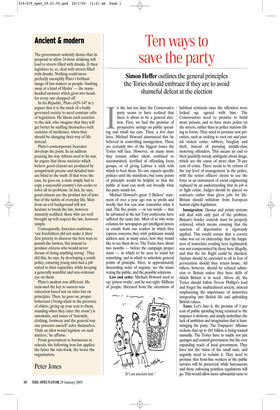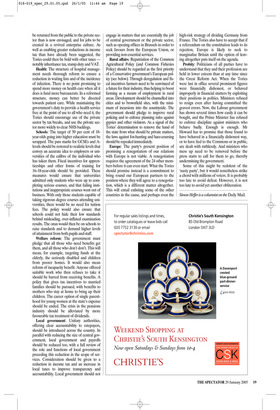Ten ways to save the party
Simon Heffer outlines the general principles the Tories should embrace if they are to avoid shameful defeat at the election In the last ten days the Conservative party seems to have realised that there is about to be a general election. First, we had the promise of prospective savings on public spending and small tax cuts. Then, a few days later, Michael Howard announced that he believed in controlling immigration. These are certainly two of the biggest issues the Tories will face. However, on many more they remain either silent, confused or uncommitted, terrified of offending focus groups, or of giving Labour a stick with which to beat them. No one expects specific policies until the manifesto, but some points of principle would be helpful so that the public at least can work out broadly what the party stands for.
Michael Howard’s great ‘I Believe’ statement of over a year ago was so prolix and woolly that few can now remember what it said. The five points — or ten words — that he advanced at the last Tory conference have suffered the same fate. Most of us who write columns for newspapers get intelligent letters or emails from our readers in which they express concerns they wish politicians would address and, in many cases, how they would like to see them do so. The Tories have about two months — before the campaign proper starts — in which to be seen to stand for something, and in which to articulate general points of principle. Here, in approximately descending order of urgency, are the issues vexing the public, and the possible solutions.
Law and order: Michael Howard used to say ‘prison works’, and he was right. Millions of people, liberated from the attentions of habitual criminals once the offenders were locked up, agreed with him. The Conservatives need to promise to build more prisons, and to have more police on the streets, rather than in police stations filling in forms. They need to promise new priorities, such as seeking to root out and punish violent crime, robbery, burglary and theft, instead of pursuing middle-class motoring offenders. This means an end to their painfully trendy ambiguity about drugs, which are the cause of more than 70 per cent of crime. There needs to be reform of the top level of management in the police, with the senior officers’ desire to use the force as an instrument of social engineering replaced by an understanding that its job is to fight crime. Judges should be placed on contracts rather than given jobs for life. Britain should withdraw from European human rights legislation.
Immigration: Quotas and points systems will deal with only part of the problem. Britain’s border controls must be properly enforced, which means ensuring that the sanction of deportation is rigorously applied. This would ensure that a correct value was set on citizenship, that the happiness of minorities residing here legitimately was not compromised by those here illegally, and that the far Right could be checked. Asylum should be extended to all in fear of persecution should they return home. All others, however, should be refused admission to Britain unless they have skills of which Britain is in need. Above all, the Tories should follow Trevor Phillips’s lead and forget the multicultural society, instead emphasising the importance of minorities integrating into British life and upholding British values.
Taxes: Let’s face it, the promise of 1 per cent of public spending being returned to the taxpayer is derisory, and simply underlines the lack of ambition and imagination that is hamstringing the party. The Taxpayers’ Alliance reckons that up to £81 billion is being wasted annually. The Tories have to tackle not just quangos and central government, but the ever expanding reach of local government. They have lost the vision of the small state, and urgently need to reclaim it. They need to promise that front-line workers in the public services will be preserved, while bureaucrats and those enforcing pointless regulations will go. This would allow more substantial sums to be returned from the public to the private sector than is now envisaged, and for jobs to be created in a revived enterprise culture. As well as enabling greater reductions in income tax than have already been suggested, the Tories could then be bold with other taxes notably inheritance tax, stamp duty and VAT.
Health: The structure of hospital management needs thorough reform to ensure a reduction in waiting lists and of the incidence of infection. There is no point promising to spend more money on health care when all it does is fund more bureaucrats. In a reformed structure, money can better be directed towards patient care. While maintaining the government’s duty to provide a health service free at the point of use to all who need it, the Tories should encourage use of the private sector by tax breaks, and use the private sector more widely to clear NHS backlogs.
Schools: The target of 50 per cent of 18year-olds going into higher education must be scrapped. The pass marks for GCSEs and Alevels should be restored to realistic levels that convey an accurate idea to employers or universities of the calibre of the individual who has taken them. Fiscal incentives for apprenticeships and other forms of training for 16–18-year-olds should be provided. These measures would ensure that universities admitted only students who were up to completing serious courses, and that failing institutions and inappropriate courses went out of business. With only those students capable of taking rigorous degree courses attending universities, there would be no need for tuition fees. The policy would also ensure that schools could not hide their low standards behind misleading, over-inflated examination results. The onus would then be on schools to raise standards and to demand higher levels of attainment from both pupils and staff.
Welfare reform: The government must pledge that all those who need benefits get them, and all those who don’t don’t. This will mean, for example, targeting funds at the elderly, the seriously disabled and children from poorer homes. It would also mean reform of incapacity benefit. Anyone offered suitable work who then refuses to take it should be barred from receiving benefits. A policy that gives tax incentives to married families should be pursued, with benefits to mothers who stay at home to bring up their children. The career option of single parenthood for young women at the state’s expense should be ended. The crisis in the pensions industry should be alleviated by more favourable tax treatment of dividends.
Local government: Unitary authorities, offering clear accountability to ratepayers, should be introduced across the country. In parallel with reducing the size of central government, local government and payrolls should be reduced too, with a full review of the role and functions of local government preceding this reduction in the scope of services. Consideration should be given to a reduction in income tax and an increase in local taxes to improve transparency and accountability. Local government should not engage in matters that are essentially the job of central government or the private sector, such as opening offices in Brussels in order to seek favours from the European Union, or providing non-essential services.
Rural affairs: Repatriation of the Common Agricultural Policy (and Common Fisheries Policy) should be regarded as the first priority of a Conservative government’s European policy (see below). Through deregulation and fiscal incentives farmers need to be convinced of a future for their industry, thus helping to boost farming as a means of employment in rural areas. Development should be channelled into cities and to brownfield sites, with the minimum of incursions into the countryside. The government should pledge to improve rural policing and to enforce planning rules against gypsies and other violators. As a signal of the Tories’ determination to remove the hand of the state from what should be private matters, the laws against fox-hunting and hare-coursing should be repealed immediately.
Europe: The party’s present position of promising a renegotiation of our relations with Europe is not viable. A renegotiation requires the agreement of the 24 other members before it can even start. What the Tories should promise instead is a commitment to bring round our European partners to the position where they will agree to a renegotiation, which is a different matter altogether. This will entail enlisting some of the other countries in the cause, and perhaps even the high-risk strategy of dividing Germany from France. The Tories also have to accept that if a referendum on the constitution leads to its rejection, Europe is likely to seek to marginalise Britain until the option of leaving altogether puts itself on the agenda.
Probity: Politicians of all parties have to understand that they and their profession are held in lower esteem than at any time since the Great Reform Act. When the Tories were last in office several prominent figures were financially dishonest, or behaved improperly in financial matters by exploiting their positions in politics. Ministers refused to resign even after having committed the gravest errors. Now, the Labour government has shown several times how easily it can be bought, and the Prime Minister has refused to enforce discipline against ministers who behave badly. Enough is enough. Mr Howard has to promise that those found to have behaved in a financially dishonest way, or to have lied to the Commons or in public, are dealt with ruthlessly. And ministers who mess up need to be removed before the press starts to call for them to go, thereby undermining the government.
Some of this might be redolent of the ‘nasty party’, but it would nonetheless strike a chord with millions of voters. It is probably too late to avoid defeat. However, it is not too late to avoid yet another obliteration.
Simon Heffer is a columnist on the Daily Mail.
















































 Previous page
Previous page